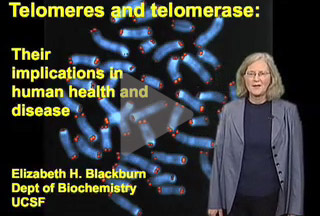Professor Elizabeth Blackburn, the first Australian woman awarded a Nobel Prize, is currently visiting my city and the local press took the opportunity to interview her about her award winning work on the the role of the enzyme telomerase. Telomeres are the 'end caps' on DNA strands, like the plastic ends on shoelaces that stop them from fraying, or in the case of DNA, allow cells to divide while holding the important genetic material intact. Telomerase, the enzyme that Professor Blackburn co-discovered, stops these telomeres from shortening and can even lengthen them. Thus influences on the effectiveness of telomerase also influence the length of a healthy lifetime or 'lifespan.'
In the interview Professor Blackburn said that "there are studies showing that if you live a generally healthier lifestyle, exercise, reduce stress and have social support, we start to see telomere maintenance is better". She also mentioned that Omega 3 is related to improvement in telomere length and "it has been observed over and over again that in those that do pretty decent exercise you see their telomere length is better, especially in settings of stress..it seems to offset stress".
When asked "Can people over do it?", she responded, "...if you overdo exercise, we see the telomere maintenance worsen".
She then went on to state "People are now saying the biggest cardio disease risk factor is not genes, it is socio-economics. Telomeres lie at the central node of all this." This is behind Professor Blackburn's current interest in looking at the the role meditation can play in replenishing telomeres.
The newspaper article grabbed my attention because a study has shown that in CLL, "Short telomere/high telomerase profile was independently associated with more rapid disease progression."
ncbi.nlm.nih.gov/pmc/articl...
Neil
